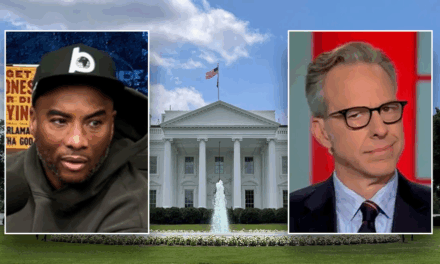In the ever-evolving landscape of US politics, CBS News anchor Margaret Brennan has found herself prominently in the spotlight once again. This time, it involves a heated exchange with a White House administration official, adding yet another layer of complexity to the ongoing legal battles surrounding former President Donald Trump. With the media and political worlds closely scrutinizing the ramifications of the litigation against Trump, Brennan’s role as a journalist has brought her into the fray of this high-stakes drama.
Brennan, who hosts the CBS program “Face the Nation”, is known for her incisive questioning and ability to hold powerful figures accountable. During a recent interview, she challenged a White House spokesperson on critical issues regarding Trump’s legal challenges, particularly news surrounding ongoing investigations and lawsuits. Her direct approach not only illuminated the intricacies of those investigations but also showcased her dedication to journalistic integrity.
The backdrop to this latest encounter features an intricate web of lawsuits that Trump currently faces, ranging from allegations of fraud to classified document mishandling. As Brennan navigated the discourse with the administration official, it became clear that the stakes are exceedingly high—both for Trump and the country. As various legal avenues unfold, the intersections of media, law, and politics continue to make this a focal point for American citizens with concerns about democratic processes and accountability.
This latest interview came amidst a broader context of political upheaval in the nation. With the upcoming presidential elections fast approaching, the legal troubles faced by Trump are not merely background noise; they are central to the narratives being spun by both supporters and detractors. Many are pondering how these legal challenges will influence not only Trump’s candidacy but the Republican Party as a whole. Brennan’s pointed inquiries during her conversation drew attention to these critical implications.
One of the noteworthy aspects of Brennan’s interview was her focus on the administration’s communication approach regarding the ongoing litigation. She pressed the spokesperson about the transparency of information shared with the public and questioned the administration’s stance on accountability. This line of questioning is especially vital considering how information dissemination affects public opinion during such a divisive time.
The implications of Brennan’s questions resonate beyond mere journalistic curiosity. They raise fundamental issues about the responsibility of government officials to provide honest and forthright answers to the pressing concerns of the American public. The apparent lack of clarity from this administration over legal matters, particularly those involving a former president, has stirred frustration among many citizens who believe they deserve straightforward answers.
As Brennan’s interview gained traction, it sparked further discussions across social media platforms and news outlets. Her willingness to confront administration officials regarding the realities of Trump’s ongoing litigation has positioned her at the forefront of a crucial conversation on media’s role amidst political turbulence. Critics and supporters alike were quick to weigh in, highlighting how her approach exemplifies the necessity of a vigilant press in holding those in power accountable.
This recent encounter also emphasizes the intensifying scrutiny that journalists face when covering contentious political issues. In an era where attacks on the media have become alarmingly common, Brennan’s role as a white-knuckled questioner showcases the importance of ethical journalism. Her commitment to presenting facts and seeking accountability inspires a renewed emphasis on ground-level reporting amidst high-stakes narratives.
The ongoing legal battles surrounding Trump reveal a myriad of complexities that may have far-reaching consequences for the country’s political landscape. From the former president’s legal strategies to the implications for his supporters, these developments will likely influence voter demographics and party dynamics in the lead-up to the presidential election. Brennan’s interactive style and willingness to engage challenging topics align journalistic inquiry with public necessity, offering a vital lens on the intentions behind official statements and legal maneuvers.
As CBS and other news outlets continue to cover the escalating legal intricacies surrounding Trump, it remains to be seen how his coalition will adapt to these pressing challenges. Brennan’s direct exchange with the administration official exemplifies how the media continues to serve as a bridge between politicians and the people, unyieldingly questioning narratives as they evolve.
Brennan’s interview not only underscores the inseparable link between journalism and democratic accountability but also reflects the deepening divisions that characterize the current political environment. Observing how the Republican Party rallies around Trump amid his legal issues will be critical for political analysts and voters alike. How do political figures reconcile support for a candidate embroiled in controversy, especially as they prepare for an impending election cycle? It is questions like these that will continue to define political discourse.
Furthermore, the media’s responsibility in reporting these unfolding dramas cannot be overstated. As Americans become more attuned to the intricacies of political and legal narratives, there is a pressing demand for reporters like Margaret Brennan to illuminate these stories with clarity and precision. The public, seeking to understand complex legalities, turns to journalists to sift through layers of information. The obligation to provide thorough yet comprehensible coverage remains an essential pillar of a functioning democracy.
In sum, Brennan’s powerful interaction with a White House official not only sheds light on Trump’s ongoing legal struggles but also highlights significant themes in contemporary journalism: accountability, transparency, and the essential role of the media in informing the public. As the political atmosphere grows increasingly charged, her commitment to rigorous questioning resonates with a populace that expects and demands answers about their leaders and the institutions that govern their lives. The implications of this conversation will echo into the larger dialogue as the nation braces itself for what lies ahead in both political and legal realms.
With the horizon of the 2024 elections edging closer, the intertwining narratives of Trump’s legal challenges and media accountability will undoubtedly remain at the forefront of American political discourse. As advocates for democracy, journalists and members of the public alike will need to remain vigilant, ensuring that the quest for truth and transparent governance prevails above all else.
As the drama continues to unfold, both in courts and on news platforms, the eyes of the country will be firmly fixed on what comes next—both for Trump and the broader societal implications of this ongoing saga. Through it all, voices like Margaret Brennan’s serve to remind us of the essential role of inquisitive journalism in shaping and safeguarding the principles of democracy.
































